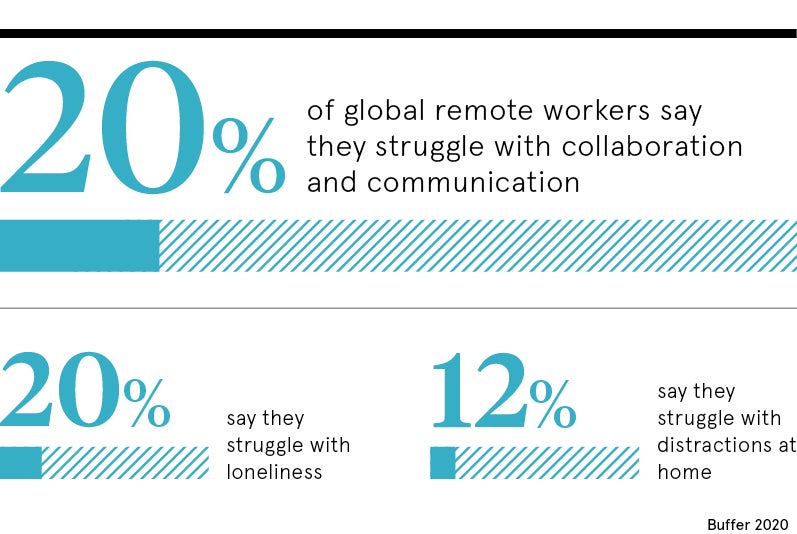
With remote working now mandated for many of us, making it work for different groups of employees is the next big challenge for business leaders. Why do some people work well virtually while others struggle? The coronavirus pandemic is affecting everyone, but employees are not all the same. It’s time for employers to look beneath the surface and really get to know their employees.
To find out how individual personality types feel about remote work, Dr Chidiebere Ogbonnaya, senior lecturer in organisational behaviour and human resource management at the University of Sussex, surveyed 3,200 workers across the UK. Respondents were asked to rate themselves on personality traits such as conscientiousness, introversion, neuroticism, openness to experience and agreeableness.
What Ogbonnaya discovered was that those who were curious and eager to try new things were less worried and less miserable about working remotely. Introverts and those who are generally agreeable also reported higher levels of satisfaction. Conversely, people who are neurotic were more likely to report worse mental health when working remotely. In addition, those who scored low on conscientiousness – put bluntly, those who are disorganised – also struggled to work remotely.
“We often think of remote working as a good thing, as having more freedom or a better work-life balance,” says Ogbonnaya. “Yes, it may well be, but not for everyone. Some people struggle with depression and anxiety or even get frustrated when asked to work alone. I think we should give more attention to how people’s personality traits affect their wellbeing.
“When someone is messy and disorganised, they find it harder to plan or manage their time properly. This causes a lot of anxiety, particularly when they have to work remotely. Neurotic people have similar problems because they tend to have more angry and depressed moods than others. We need to support them better. For example, give them more flexible deadlines and avoid putting them under too much pressure or stress.”
Consider the circumstances your employees face
It’s equally important for business leaders to consider the disparate circumstances people face. The pandemic has, for instance, exacerbated gender inequality. Women have spent 15 hours more on domestic labour each week than men, according to a study by Boston Consulting Group.
We’re all experiencing the pandemic differently and Melinda Briana Epler, founder and chief executive of San Francisco-based Change Catalyst, points out that “Black, indigenous and Latinx folks are disproportionately feeling the impact of the job loss and insecurity, extra parenting duties, COVID-19 and racial injustice; now is not the time to ignore these”.
People in their 40s who have children and live in a four-bedroom house are experiencing the pandemic in a very different way from someone who lives in a one-bedroom flat in Hackney, east London, with their family, says Michael Moran, founder and chief executive of career and talent management consultancy 10Eighty. Younger people whose social life centres around their workplace struggle more than those whose friends largely work elsewhere.
Epler notes that many people have a new job they didn’t bargain for: teaching their children. “Lots of people are feeling uncertainty around job security, furloughs, family members who have lost their jobs, also of course COVID, whether it’s life disruptions, anxiety and depression, Illness, death of family members and friends,” she says. “Personality tests are great when we’re not in a pandemic; now is the time to really get to know your team by asking what they need and listening.”
Marilyn Chaplin, chief human resources officer at NTT, echoes this point. “It’s vital to have conversations with every employee to set expectations and find out more about the impact of remote working on their schedules and them personally,” she says.

Work will stay flexible in the long run
It’s clear that new forms of working are here to stay. Chris Kane, author of Where is My Office?: Reimagining the Workplace for the 21st Century, says: “Many people are asking themselves, why do I need to spend a fortune, have a long commute, and a lot of personal and mental discomfort to go to an office to send emails?” For business leaders, managing groups of people who are working in a variety of work settings calls for a lot more empathy and a move away from a command-and-control management style.
What’s more, the economic fallout from the pandemic means companies are going to be keen to cut costs, as well as trying to keep the right employees, by being an employer of choice, says Kane. “So they’re going to have to recognise employees’ needs,” he says.
In November, Standard Chartered, for example, announced it plans to offer flexible work options to more than 90 per cent of its 85,000 employees by 2023. This will include flexibility on both time – the number of hours and days – and location, which could include the bank’s premises, near-home workspaces
or home.
In addition to changes brought about by the pandemic, Tanuj Kapilashrami, group head of human resources at the bank, cites productivity, wellbeing and carbon footprint as drivers of this decision. “We also see this as an opportunity to appeal to a wider and more diverse potential future workforce,” she says.
Business leaders, who want to understand their employees, need to consider both personality types and individual circumstances because mental health and wellbeing can no longer be ignored. And this means seeing employees in a more holistic way, in other words as human beings, rather than office drones.

With remote working now mandated for many of us, making it work for different groups of employees is the next big challenge for business leaders. Why do some people work well virtually while others struggle? The coronavirus pandemic is affecting everyone, but employees are not all the same. It’s time for employers to look beneath the surface and really get to know their employees.
To find out how individual personality types feel about remote work, Dr Chidiebere Ogbonnaya, senior lecturer in organisational behaviour and human resource management at the University of Sussex, surveyed 3,200 workers across the UK. Respondents were asked to rate themselves on personality traits such as conscientiousness, introversion, neuroticism, openness to experience and agreeableness.
What Ogbonnaya discovered was that those who were curious and eager to try new things were less worried and less miserable about working remotely. Introverts and those who are generally agreeable also reported higher levels of satisfaction. Conversely, people who are neurotic were more likely to report worse mental health when working remotely. In addition, those who scored low on conscientiousness – put bluntly, those who are disorganised – also struggled to work remotely.
